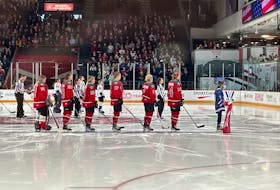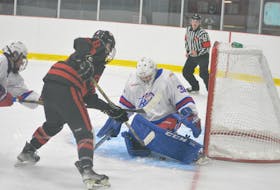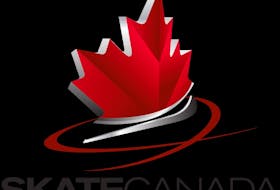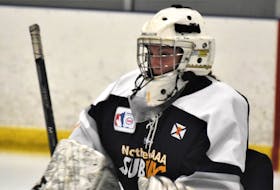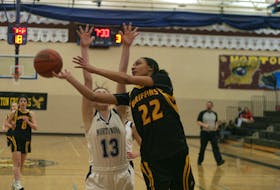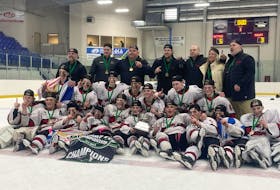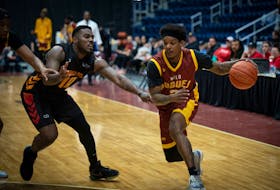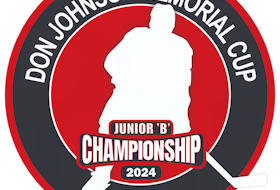SYDNEY — Sitting in the basement of his home, Blair (Bearcat) Joseph stares at the Cape Breton Pepsi Islanders team picture on a wall filled with sports memorabilia.
The Sydney product was the head coach of the Islanders during the club’s only full year in the Maritime Junior Hockey League in 1996-97.
“It’s hard to believe it’s been 25 years already for the team,” said Joseph. “We had some really good players and really good goaltending and the fan support was outstanding.”
Cape Breton joined the league as an expansion franchise following the departure of the American Hockey League’s Cape Breton Oilers at the end of the 1995-96 campaign.
The Islanders played one season at Centre 200 in Sydney, before moving to Glace Bay and changing the team’s name to the Miners. The arrival of the Quebec Major Junior Hockey League’s Cape Breton Screaming Eagles in 1997 combined with financial issues led the club to fold after only 24 games in Glace Bay.
And junior ‘A’ hockey has not returned to Cape Breton.
JOINING THE LEAGUE
When the NHL’s Edmonton Oilers moved the Sydney-based Oilers to Hamilton, Ont., it was a major loss for Cape Breton hockey fans and Centre 200, a facility whose main tenant had been the AHL club since 1988.
With much uncertainty about hockey in the community, longtime local radio personality Dave LeBlanc was approached with the idea of bringing a junior ‘A’ franchise to Cape Breton.
“Andy Price, who ran the concessions at Centre 200, needed another tenant in the building so he could make money,” said LeBlanc. “He called me and asked if we could get into the Maritime Junior Hockey League and asked if I’d carry the ball.”
LeBlanc agreed and prepared an application for the junior ‘A’ league’s board of governors.
“There were quite a few meetings,” said LeBlanc, who served as the team’s president and general manager. “I don’t think they had any doubt that we could get it going and do well for the first part of it anyway.”
Despite the excitement around the team, LeBlanc admits there were a few financial hiccups prior to the season.
“We came to the realization it was going to cost a little bit of money to get going,” said LeBlanc. “We didn’t have any seed money or anything, so there were lots of discussions, but for the most part we were able to get it going.”
After paying the $25,000 league entry fee, the club hired Joseph as the head coach and he was tasked with putting together a staff and starting from scratch with no players.
Off the ice, LeBlanc said the team struggled financially, but credits Cape Breton Beverages and the late Greg Lynch for helping the team get through its only full season.
“We had financial woes, but Greg got us through it and it meant a lot to us,” he said. “If you look at the team picture, Greg wasn’t there, but he was behind us and was a major part of it.”

FAN SUPPORT
The financial issues were no fault of Cape Breton hockey fans.
Prior to the start of the season, the Islanders held a season ticket drive, which LeBlanc still to this day considers a success.
“The fan support was amazing — we sold lots of season tickets, but it was an expensive team to operate,” said LeBlanc. “We were at one end of the province and Maritimes and the farthest point was in the Campbellton area in New Brunswick and that was quite a trip.
“It cost us a lot of money to run the team. There was no money left at the end of the day, but I think we did well. If we had a couple more years it might have been different, but we didn’t.”
During the regular season, the team averaged more than 2,000 fans per game through 28 home games. Close to 4,000 people attended the home opener. The team’s playoff average attendance was 2,571 per game — in the same range as today’s Cape Breton Eagles average attendance — with 12,855 fans attending the postseason home games.
“We had good crowds for the most part and in the playoffs we had great crowds,” said LeBlanc. “The fan support was there. If someone started a junior ‘A’ team in Cape Breton tomorrow, people would support it.”
THE PLAYERS
Something rarely seen today, LeBlanc and Joseph recruited 14 local players including Glace Bay’s Kirk Furey and New Waterford’s Chris Angione to play for the Islanders.
The local representation also included Derrick MacCormack (Sydney River), Cory Doucet (Cheticamp), Chris Neville (Sydney), Patrick Lamey (New Waterford), Andreas Nannos (Glace Bay), Craig Lynk (Sydney) and Kevin Parks (Sydney Mines).
Charlie Aucoin (Sydney), Ross Sampson (St. Peter’s), B.J. Gallivan (Sydney), Carl MacKinnon (Baddeck) and Craig Campbell (Sydney) rounded out the local players on the team.
“We didn’t know what to expect. The team wasn’t strong at first, we had the local guys, but we knew we needed a little bit more,” said Joseph.
“We started off slow, but as the season went on, we started filling the holes with some quality players and then we came together pretty good — we became a family.”
The club would add import players Ryan Mair, Welsey Swain, Chris Cahoon, Troy Milne and Justin Johnson along with Russian netminder Dmitri Boshkov.
“Boshkov was in Canada for a tournament and his agent was looking for a place for him to play,” said Joseph. “We brought him in and he was very good, but we already had Doucet.
“Cory knew he had to fight for the No. 1 spot and brought his game to a whole new level. It was a win-win situation at the time for us because both were outstanding.”
LeBlanc said the players also came at a financial cost.
“We got into bidding wars for players,” he said, noting the team paid for the players sticks, ice time and accommodations. “We were a new team and we wanted to make as big of an impact as possible.”
“We were paying bonuses to players and we offered that to attract them to come to the team — they needed a reason to come. We had a payroll for players. We had to pay the price.”
THE SEASON
The Islanders were one of 10 teams in the 1996-97 Maritime league.
Cape Breton played in the Maurice Bent Division with the Jim Bottomley-coached Dartmouth Oland Exports, East Hants Penguins, Antigonish Bulldogs and Amherst Mooseheads.
The club finished the 56-game regular season in fourth place with a 21-29-5-1 record, the third-highest goals for (280) and the second-highest goals against (300) among the five teams.
The Roger Meek division featured the Gerard Gallant-coached Summerside Western Capitals, Moncton Beavers, Charlottetown Abbies, Restigouche River Rats and the Saint John Alpines, who folded after 33 games.
The Islanders were led offensively by Angione, who had previously played major junior hockey with the Swift Current Broncos, Halifax Mooseheads and Moncton Alpines, before suiting up for the junior ‘A’ Oland Exports.
The forward finished the campaign with a team-leading 62 goals and 67 assists for 129 points in 50 games. He added 12 goals and 21 points in 10 playoff games.
“The players I played with were phenomenal,” said Angione, noting he played on a line with imports Cahoon and Johnson.
“It wouldn’t have happened without them, but it seemed like it was one of those years where the pucks were going in the net. My linemates were definitely a big part of my success.”
Angione recognized the local talent on the team.
“We had so many great local players and it almost seemed like we all gelled early on and continued throughout the year,” said Angione. “Blair and Dave did a great job with the team and getting players in that kept the chemistry together.”
In the playoffs, the Islanders eliminated the Mooseheads, winning the best-of-three series 2-1. They went on to play the first-place Oland Exports in the division final and surprised many.
The Islanders had the Oland Exports down 3-2 in the series with Game 6 in Sydney when the tables turned.
“It was a 2-2 hockey game,” said Joseph. “Furey was behind the net and he shot a beautiful pass up to the red line right on Angione’s stick — the guy we wanted to have the puck — and a local linesman called a two-line pass.
“I watched it a couple of times and it was tight, but we were all right, there was no way it was a two-line pass. If Angione would have scored, there was less than two minutes to play, we probably would have bet the No. 1 team.”
The Islanders and Oland Exports hopped on a bus and headed for Halifax for Game 7 the following day. The Islanders would lose and the Oland Exports would play the Western Capitals for the league title.
A highlight of the local season was the MHL’s all-star game at Centre 200 with NHL legends Gordie Howe and Johnny Bower taking part in the ceremonial puck drop.
THE BRAWL
A low point of the season for the Islanders organization came early in the year when a brawl broke out between Cape Breton and the Antigonish Bulldogs with close to 4,000 fans at Centre 200.
“Danny Berry was a veteran coach in the league with Antigonish and he wanted both teams to be competitive because we were the closest rivals to each other,” said Joseph.
“Danny wanted to build it up and he thought having some fights would be good for the fan support, but things got out of hand that night.”
The incident began with two players fighting in front of the Cape Breton bench early in the first period. As the players were directed to their respective dressing rooms, an Antigonish coach and a Cape Breton player exchanged words between the benches, which caused the players to converge near the bench divider.
A Bulldogs player swung his stick at the Cape Breton player over the divider and chaos ensued with numerous sticks swinging incidents as well as water coolers and puck bags thrown back-and-forth.
“It got messy,” said Joseph. “It wasn’t a nice atmosphere to be involved in and it wasn’t something that was planned — it really wasn’t — it was something that got out of hand and it’s as simple as that."
As cooler heads prevailed, a Antigonish coach directed the remaining players on his bench to go on the ice, essentially inviting Cape Breton to have a bench-clearing brawl.
“I kept my players on the bench,” said Joseph. “I was asked to clear my bench and let everyone fight, but It was one of our first home games and I didn’t want that to happen.
"I’d say 1,500 of the 4,000 fans probably loved it, but a lot of people didn’t think that it was hockey. They were right. It did get out of hand and I couldn’t let my bench go or it would have been really bad.”
Meanwhile, as some Antigonish players remained on the ice, a fan jumped into the Bulldogs bench and began fighting with several players. He later returned to the stands.
The game continued with no more fighting.
The next day Cape Breton and Antigonish were scheduled to play at the Antigonish Arena. The game was sold-out with fans lining up outside to get into the rink.
“The league had called us after the game because the way the rink in Antigonish was, we had to skate through the Bulldogs to get to our side of the rink coming out of the dressing room,” said Joseph.
“We thought it was going to get messy and so did the league, who warned us of big suspensions if there was any trouble.”
Joseph recalls meeting with Berry prior to the game and agreeing there wouldn’t be any issues, but it was on Joseph’s mind at the time.
“I was holding my breath because I could feel the tension, but they didn’t do anything,” laughed Joseph. “The game itself was great. It was hockey. There were no fights and everything worked out.”
Joseph said the remainder of the season was focused strictly on playing hockey and avoiding brawls.
Meanwhile, LeBlanc still describes the brawl as a low-point in the organization’s history.
“I don’t know what it did for us,” said LeBlanc. “I think it kind of hurt us a little bit with the fans but for the most part they did come back.”

MAJOR JUNIOR
Major junior hockey arrived in Cape Breton in 1997 when a local group purchased the QMJHL’s Granby Prédateurs, who had won the Memorial Cup in 1996.
The franchise was renamed the Cape Breton Screaming Eagles and moved into its new home at Centre 200, forcing the Islanders to find a new arena.
The Islanders moved to Glace Bay and became the Miners. The success of the Eagles was too much for the junior ‘A’ club and the club folded after 24 games — bringing an end to junior 'A' hockey in Cape Breton.
“I think the powers that be saw how junior hockey could sell in Cape Breton,” said LeBlanc. “I think they saw how well the Islanders were doing and asked themselves what major junior could do, and the rest is history.
“Nobody was out to kill the Cape Breton Islanders. It was a natural progression. There’s only so many sponsorship dollars and there’s only so many fan dollars, so when the Eagles came to town, we knew it was going to happen — we tried in Glace Bay, but it didn’t go.”
Joseph said there were issues with the move to Glace Bay.
“Glace Bay was too small,” he said. “We were lucky to get 600 or 700 people inside and that wasn’t going to pay the bills, so we had to fold the team.”
As for the Eagles, the team remains a staple in the Cape Breton community and they will celebrate their 25th anniversary in Sydney during the 2021-22 campaign.

